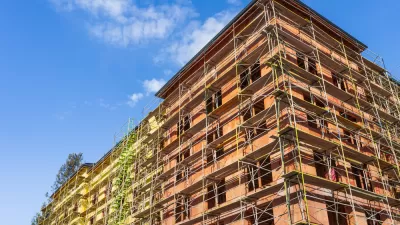The CodeNext project of updating the city of Austin's zoning code and land use policies has faced a controversial and protracted period of public scrutiny. The Allandale neighborhood provides a case study.
Catherine Marfin reports on potential changes to the zoning code in the Austin neighborhood of Allandale, as proposed by the draft of the CodeNext zoning code overhaul.
"Most of the existing regulations for the city’s residential neighborhoods were preserved in the initial draft of CodeNEXT, the overhaul of the Austin’s land use and zoning policies," writes Marfin. "Yet some communities, Allandale more than most, could see far more sweeping changes."
According to Marfin, Allandale is mostly a single-family neighborhood, "established in several phases from the late 1940s to the late 1960s" and "characterized by the post-World War II and midcentury single-family houses, the many original homeowners and the tree canopies lining the streets."
Under CodeNEXT, 80 percent of the neighborhood is zoned as a transect, and residents are concerned that designation strays too far from the single-family zoning currently in place. One building type that could potentially be developed in the neighborhood if it becomes a transect zone: cottage courts. Some residents, as represented by the Allandale Neighborhood Association, have collected their critiques of CodeNEXT into a position paper [pdf]. The question of whether the existing character of the neighborhood has been protected in line with expectation of these residents is obviously still up for debate.
FULL STORY: CodeNext draft proposes major changes for anxious Allandale community

Alabama: Trump Terminates Settlements for Black Communities Harmed By Raw Sewage
Trump deemed the landmark civil rights agreement “illegal DEI and environmental justice policy.”

Study: Maui’s Plan to Convert Vacation Rentals to Long-Term Housing Could Cause Nearly $1 Billion Economic Loss
The plan would reduce visitor accommodation by 25% resulting in 1,900 jobs lost.

Planetizen Federal Action Tracker
A weekly monitor of how Trump’s orders and actions are impacting planners and planning in America.

This Toronto Suburb Has More Bus Riders Than Columbus, Ohio
Brampton, Ontario used gradual improvements in service to prove that if you build it, they will ride.

Paris Bike Boom Leads to Steep Drop in Air Pollution
The French city’s air quality has improved dramatically in the past 20 years, coinciding with a growth in cycling.

Why Housing Costs More to Build in California Than in Texas
Hard costs like labor and materials combined with ‘soft’ costs such as permitting make building in the San Francisco Bay Area almost three times as costly as in Texas cities.
Urban Design for Planners 1: Software Tools
This six-course series explores essential urban design concepts using open source software and equips planners with the tools they need to participate fully in the urban design process.
Planning for Universal Design
Learn the tools for implementing Universal Design in planning regulations.
Smith Gee Studio
Alamo Area Metropolitan Planning Organization
City of Santa Clarita
Institute for Housing and Urban Development Studies (IHS)
City of Grandview
Harvard GSD Executive Education
Toledo-Lucas County Plan Commissions
Salt Lake City
NYU Wagner Graduate School of Public Service





























